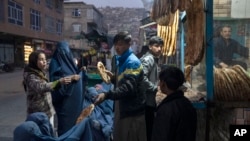The upcoming harvest is expected to bring some relief to Afghanistan’s dwindling food stocks. But World Food Program Deputy Regional Director for Asia, Anthea Webb warns this relief is expected to be short-lived.
Speaking from Bangkok, Webb says the wheat harvest season from May to August will be a lifeline for hundreds of thousands of people. However, she notes 18.9 million still will be facing acute hunger between June and November, when numbers are expected to rise again.
“Drought and economic crisis persist threatening close to 20 million people across the country. And the war in Ukraine continues to put pressure on global food and fuel prices, especially acutely in Afghanistan where they were already much higher than before.”
She says a small pocket of more than 20,000 people in Afghanistan’s northeastern province of Ghor are facing catastrophic levels of hunger and are of particular concern. She says they eat nothing but bread seven days a week and desperately need humanitarian assistance if they are to survive.
Webb says the increasingly harsh, repressive measures imposed on women by the de facto Taliban authorities are having a tragic impact on the nutritional status and well-being of their families.
Webb says she fears the Taliban’s tough stance against women is likely to alienate international donors who might be reluctant to support such an oppressive regime.
She assures donors that the money they contributed for humanitarian aid does not go to the government but to the Afghan people who require assistance now more than ever. She adds WFP requires $1.4 billion to continue its emergency lifesaving operation this year.
UN Says Record Number of Afghans Face Acute Hunger
- By Lisa Schlein




